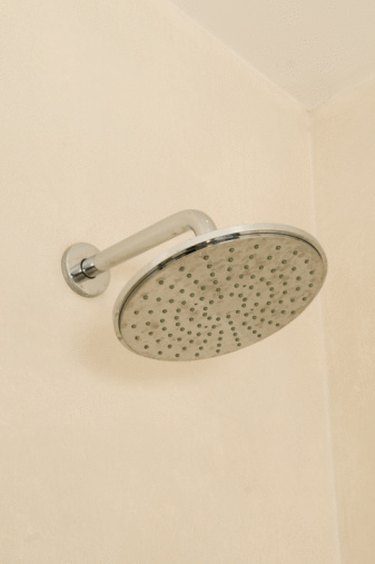Things You'll Need
Bathroom detergent
Cloth
Measuring tape
Pencil
Chalk line
Fine-toothed saw
Waterproof panel adhesive
Carpenter's level
Waterproof silicone sealant
Caulking gun
Rubber gloves

Wainscoting is a wall paneling procedure typically used to define part of the height of an internal wall. The decision to use wainscoting in a shower area may arise from the desire to replicate the wainscoting in the rest of the bathroom to produce the same style of decor throughout the area. Rather than have a large block of tiling that interrupts the design flow, the shower area can mimic the bathroom style by using plastic wainscoting to the height of the bathroom paneling.
Step 1
Clean the shower walls thoroughly to remove mold and grease, using a suitable bathroom detergent and a cloth. Rinse the walls with water to remove any detergent residue. Allow the shower walls to dry completely before installing the plastic wainscoting.
Video of the Day
Step 2
Measure the height of the wainscoting you require on the shower wall, using a measuring tape. Mark the wall with a pencil at regular intervals at the required height. Snap a chalk line along the marks to give you a horizontal line for the top of the wainscoting.
Step 3
Measure the wall along the shower pan to determine the length of wainscot base trim you require. Transfer the length measurement to the plastic base trim and cut the trim with a fine-toothed saw.
Step 4
Apply waterproof panel adhesive to the back of the base trim in a zigzag motion. Push the base trim into position so that the adhesive grips the shower wall. Ensure the base trim groove points toward the ceiling.
Step 5
Measure from the base trim groove to the chalk line to determine the length of wainscot paneling to cut. Transfer the measurement to the plastic panel, and cut the wainscot to size.
Step 6
Apply the panel adhesive to the back of the panel in the same way you did with the base trim. Slot the wainscot into the base trim groove and push the panel onto the shower wall. Use a carpenter's level to adjust the panel's vertical plane so that the wainscoting is straight.
Step 7
Measure, cut and glue the next panel using the same procedure. Slot the panel's grooved edge into the protruding tongue edge of the previously installed panel. Press the panel against the wall to ensure the adhesive bonds to the surface.
Step 8
Repeat steps 5 to 7 until the paneling is complete. Measure across the top of the plastic wainscoting to determine the length of the horizontal top trim.
Step 9
Cut and glue the top trim using the same method as you did with the base trim. Slot the top-trim groove over the top edge of the installed wainscoting and press the trim onto the shower wall.
Step 10
Run a bead of water-proof silicone sealant along all tongue-and-groove joints, including the base and top trim joints, using a caulking gun. Indent the sealant into the joint with your finger to ensure a waterproof seal.
Tip
Use nails fastened at 16-inch intervals to increase the adherence strength of the plastic wainscoting. Check for pipework in the walls before installing nails.
Warning
Wear rubber gloves when applying panel adhesive and sealant in order to avoid chemical contact.
Video of the Day